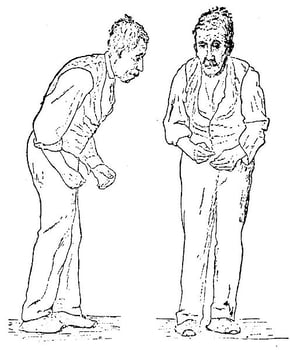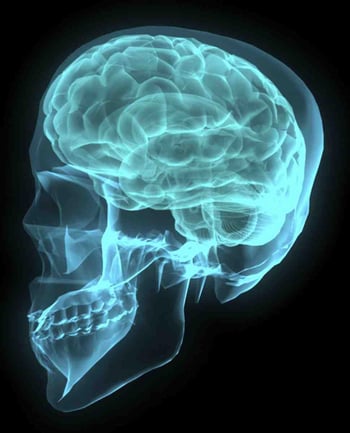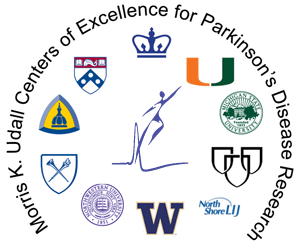Parkinson’s is a degenerative condition that affects over one million Americans - even greater than the number of those suffering from multiple sclerosis, muscular dystrophy and Lou Gehrig's disease combined. There is no cure, but this month researchers at the University of Alabama at Birmingham made two important breakthroughs for treating the disease. One group of researchers has discovered the cause of the negative side-effects of L-DOPA and a potential way to counter-act it. Another group of researchers have “discovered an interaction in neurons that contributes to Parkinson’s Disease and they have shown that drugs now under development may block the process.”

(Image of the University of Alabama, Birmingham courtesy of Jaymay via Wikimedia Commons)
Read More
Tags:
Parkinson's Disease Research,
University of Alabama Birmingham,
University of Alabama at Birmingham,
Parkinson's Disease,
biomedical researh,
Dr. Volpicelli-Daley,
Dr. Standaert

(1886 Sketch of Person with Parkinson's by Sir William Richard Gowers Courtesy of Wikimedia Commons)
Researchers at the University of Alabama, Birmingham have discovered a potential new approach to reducing the damage done by Parkinson's disease. They found that suppressing a key cell-signaling pathway in the brain lessened the destructive inflammation and nerve degradation in the area of the brain affected by Parkinson’s. In the study, rats were used to model the disease by inducing an overexpression of a-synuclein, a protein that is abundant in the human brain. The accumulation of α-synuclein is a core feature of Parkinson’s disease. This accumulation leads to the activation of the brain's immune cells and the production of inflammatory signaling chemicals, which leads to neurodegradation. The rats that were then given a JAK/STAT pathway inhibitors (known as Jakinibs) did not have the immune response, the inflammatory activation, or the neurodegeneration that those that did not receive the inhibitor experienced.
Read More
Tags:
Parkinson's Disease Research,
Alabama,
University of Alabama,
University of Alabama Birmingham,
UAlab,
Birmingham,
AL,
University of Alabama at Birmingham,
2016,
Parkinson's Disease
A new strategy for combating the neurologically destructive effects of Parkinson's Disease has been developed jointly by researchers at the University of Pittsburgh and the University of Pittsburgh School of Medicine.
Read More
Tags:
University of Pittsburgh,
Parkinson's Disease Research,
gene therapy,
UPITT,
PA,
Pittsburgh,
Parkinson's Disease
 Parkinson's Disease is a devastating neurodegenerative disease that affects people's motor functions. As of today, there are no cures for Parkinson's Disease, and treatments are only able to alleviate symptoms. Researchers across the nation are heavily studying the disease, with the goal of learning more about the onset and progress of the disease to help scientists develop treatment methods.
Parkinson's Disease is a devastating neurodegenerative disease that affects people's motor functions. As of today, there are no cures for Parkinson's Disease, and treatments are only able to alleviate symptoms. Researchers across the nation are heavily studying the disease, with the goal of learning more about the onset and progress of the disease to help scientists develop treatment methods.
Read More
Tags:
Northeast,
Thomas Jefferson University,
Parkinson's Disease Research,
Philadelphia,
PA,
ThomJeff,
2016,
Parkinson's Disease,
BioResearch Product Faire,
GM1 ganglioside
 Six teams of researchers from leading univerisites are going to receive a set of three-year grants, totaling over $7.5 million, to create lab-grown brain cells in a process called neuronal maturation.
Six teams of researchers from leading univerisites are going to receive a set of three-year grants, totaling over $7.5 million, to create lab-grown brain cells in a process called neuronal maturation.
The funding to the various universities was made possible by The Paul G. Allen Family Foundation as part of its Allen Distinguished Investigator grants, and will ensure the continued development of important neuroscience research.
Read More
Tags:
CA,
Harvard University,
Washington,
Parkinson's Disease Research,
California,
brain research,
2015,
Alzheimer' Research,
LAVS,
Neuroscience,
BioResearch Product Faire Event,
Research Funding,
Harvard,
UCSF,
longwood,
Biotechnology Vendor Showcase Event,
best lab supply tradeshows,
best science tradeshows
 Researchers at the Broad Center of Regeneration Medicine and Stem Cell Research on the Parnassus Campus of the University of California San Francisco have just published the results of two related studies involving differentiated brain cells transplanted into mice. In one case, the cells were human brain cells integrated successfully into a mouse brain; in the other, epileptic mice were cured with specialized mouse brain cells. In both studies the differentiated cells were a type of interneuron progenitor called medial ganglionic eminence (MGE) cells. Unlike other brain stem cells that can turn into any number of specialized cells, these differentiated MGE cells have a specific function, which is to inhibit signaling in overactive nerve circuits. These experiments hold promise for future treatment of neurological disorders like Parkinson’s disease, Alzheimer’s, epilepsy, and the chronic pain and spasticity caused by spinal cord injury.
Researchers at the Broad Center of Regeneration Medicine and Stem Cell Research on the Parnassus Campus of the University of California San Francisco have just published the results of two related studies involving differentiated brain cells transplanted into mice. In one case, the cells were human brain cells integrated successfully into a mouse brain; in the other, epileptic mice were cured with specialized mouse brain cells. In both studies the differentiated cells were a type of interneuron progenitor called medial ganglionic eminence (MGE) cells. Unlike other brain stem cells that can turn into any number of specialized cells, these differentiated MGE cells have a specific function, which is to inhibit signaling in overactive nerve circuits. These experiments hold promise for future treatment of neurological disorders like Parkinson’s disease, Alzheimer’s, epilepsy, and the chronic pain and spasticity caused by spinal cord injury.
Tags:
2014,
CA,
University of California San Francisco,
2013,
University of California San Francisco Mission Bay,
University of California San Francisco Parnassus,
Parkinson's Disease Research,
Southwest,
California,
University of California,
brain research,
San Francisco,
SFVS,
Biotechnology Vendor Showcase,
UCSF,
Parnassus,
Mission Bay
 The Parkinson's Disease Biomarkers Program (PDBP) is a recently-formed NIH initiative to advance research into biomarkers for the disease in order to better understand its progress and develop treatments. Some funded projects will focus on statistical analysis tools and data sharing among researchers. Others will examine early clinical manifestations of PD in patients. Still more will involve lab studies, including identification of genetic biomarkers as well as antibodies in the blood and changes in body chemistry. All projects "must inform the etiology, pathogenesis or treatment of PD," according to grant program guidelines. Research supported by the PDBP is being carried out at the 11 Morris K. Udall Centers of Excellence in Parkinson's Disease Research (logo right), directed by the National Institute of Neurological Disorders and Stroke (NINDS) within the NIH.
The Parkinson's Disease Biomarkers Program (PDBP) is a recently-formed NIH initiative to advance research into biomarkers for the disease in order to better understand its progress and develop treatments. Some funded projects will focus on statistical analysis tools and data sharing among researchers. Others will examine early clinical manifestations of PD in patients. Still more will involve lab studies, including identification of genetic biomarkers as well as antibodies in the blood and changes in body chemistry. All projects "must inform the etiology, pathogenesis or treatment of PD," according to grant program guidelines. Research supported by the PDBP is being carried out at the 11 Morris K. Udall Centers of Excellence in Parkinson's Disease Research (logo right), directed by the National Institute of Neurological Disorders and Stroke (NINDS) within the NIH.
Tags:
2014,
2013,
Pennsylvania,
Northeast,
University of Pennsylvania,
UPenn,
Thomas Jefferson University,
Parkinson's Disease Research,
Biomarkers,
Philadelphia,
BioResearch Product Faire Event,
Funding,
Genomics,
Neurology,
NIH,
Northeast Region,
ThomJeff




 Parkinson's Disease is a devastating neurodegenerative disease that affects people's motor functions. As of today, there are no cures for Parkinson's Disease, and treatments are only able to alleviate symptoms. Researchers across the nation are heavily studying the disease, with the goal of learning more about the onset and progress of the disease to help scientists develop treatment methods.
Parkinson's Disease is a devastating neurodegenerative disease that affects people's motor functions. As of today, there are no cures for Parkinson's Disease, and treatments are only able to alleviate symptoms. Researchers across the nation are heavily studying the disease, with the goal of learning more about the onset and progress of the disease to help scientists develop treatment methods.  Six teams of researchers from leading univerisites are going to receive a set of three-year grants, totaling over $7.5 million, to create lab-grown brain cells in a process called neuronal maturation.
Six teams of researchers from leading univerisites are going to receive a set of three-year grants, totaling over $7.5 million, to create lab-grown brain cells in a process called neuronal maturation. 
 The Parkinson's Disease Biomarkers Program
The Parkinson's Disease Biomarkers Program